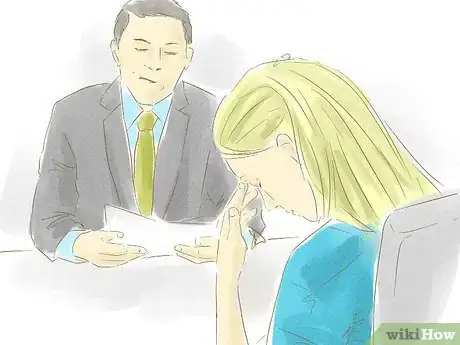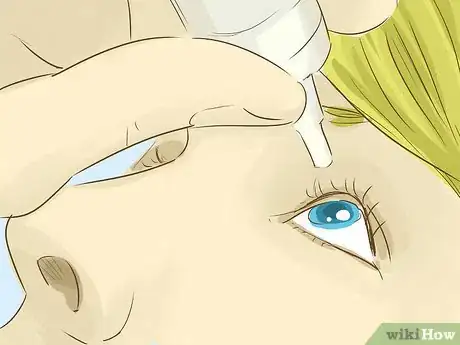This article was co-authored by Klare Heston, LCSW. Klare Heston is a Licensed Independent Clinical Social Worker based in Cleveland, Ohio. With experience in academic counseling and clinical supervision, Klare received her Master of Social Work from the Virginia Commonwealth University in 1983. She also holds a 2-Year Post-Graduate Certificate from the Gestalt Institute of Cleveland, as well as certification in Family Therapy, Supervision, Mediation, and Trauma Recovery and Treatment (EMDR).
There are 13 references cited in this article, which can be found at the bottom of the page.
wikiHow marks an article as reader-approved once it receives enough positive feedback. In this case, several readers have written to tell us that this article was helpful to them, earning it our reader-approved status.
This article has been viewed 165,783 times.
Crying in front of someone who’s yelling at you is a downright miserable experience. It’s embarrassing, and it could hurt your reputation at work, school, or home. Of course, crying is a normal part of being human, but in some situations, you’ve just got to hold your tears in – so what can you do? If you cry easily, there are a few tricks you can use to keep your emotions (and your tears) in check. It’s also a good idea to learn to compose yourself after a good cry. You can cut down on the problem in the future by practicing different ways to handle conflict.
Steps
Holding Back Tears
-
1Pinch the skin between your forefinger and thumb. Give the web of your hand a good, hard pinch. Squeeze hard enough that it hurts, but not hard enough to bruise. The pain will distract you, and you’ll be less likely to cry.[1]
- You can also pinch the bridge of your nose. This can help block tears from escaping your tear ducts.[2]
-
2Take some deep breaths. When you feel yourself getting worked up, take a few long, slow breaths. This forces your body to calm down and distracts you a little from whoever is yelling at you, which might be enough to avert a crying session.[3]Advertisement
-
3Look away. Look at something other than the person who’s yelling at you. Focus on your desk, your hands, or some other object in front of you. Breaking eye contact with the angry person will help you regain your composure.[4]
-
4Take a step back. Get some distance from the person who’s yelling at you by taking a step backwards or scooting back in your chair. Taking control of your physical space can make you feel less helpless and cut back on your urge to cry.[5]
-
5Excuse yourself from the situation. If you’re not going to be able to stop yourself from crying, step away from the situation. Make an excuse if you can, such as not feeling well. You can also just tell the person you’re getting too upset to keep talking to them. Go somewhere private to calm down.[6]
- Say something like, “I’m getting too worked up to have a productive conversation with you. I need to step away for a minute, but we can keep talking later.”
- The restroom is usually a safe place to escape to.
- Taking a walk to clear your head is also a good option. Getting a little exercise will help you feel more in control of yourself.
Composing Yourself
-
1Get some privacy. Go to your car, your office, a restroom, or somewhere else you won’t be bothered. If you need to cry, let it out. Give yourself all the time you need until you feel calm again.
- If you try to stop a crying session halfway through, you’ll be more likely to start up again later.
-
2Combat eye swelling. Dab cold water underneath your eyes to cut down on redness and puffiness. You can also use an ice cube wrapped in a napkin.[7]
- If you’re at home and not in a hurry, wrap a bag of frozen peas in a kitchen towel and put it on your face, or rest cold green tea bags on your eyes.
-
3Put in eye drops. Use eye drops like Visine to get rid of any lingering eye redness. Put one or two drops in each eye. Your eyes should look clear in 10 to 15 minutes.
- If you’re a frequent crier, don’t use eye drops too often. They can actually make your eyes redder if you overuse them. A couple of times a week should be fine.
- Make sure your eye drops are safe to use with contacts, if you wear them.
-
4Fix your makeup. If you wear makeup, take a minute to touch it up. Wipe off runny eye makeup and any other areas on your face that have gotten smeared. Use foundation or concealer to hide red or blotchy areas. Finish by touching up your mascara, blush, or anything else that didn’t make it through your cry.[8]
- If you cry often, you might want to keep a small emergency makeup stash in your desk or purse.
Coping with Conflict
-
1Let people know you cry easily. If you’re prone to tearing up all the time, do some preemptive damage control by telling your boss, coworkers, family, and friends. Emphasize that it’s not a big deal, and tell them about the best way to react if it happens.[9]
- For example, you could say, “I tend to cry easily, so don’t worry if I get upset – that’s normal for me. I try to keep it under control, but if it happens, I just need a few minutes to calm down.”
-
2Talk to the person who yelled at you. After you’ve calmed down, ask the person who yelled at you if they can talk to you privately. Address the problem and apologize if you did something wrong. Then tell them how their yelling made you feel, and politely ask them to talk to you more calmly in the future.[10]
- Say something like, “I get pretty flustered when people shout at me, so it was hard for me to come up with a good solution to our problem earlier. Next time we run into an issue like this, can we talk about it when we’re both calm?”
-
3Think about why conflict makes you cry. Ask yourself what you feel when someone yells at you. If you can identify where your tears are coming from, you might be able to figure out some alternate coping strategies.[11]
- For instance, if you get overwhelmed by sheer adrenaline, you could squeeze a stress ball to release tension instead.
- If being yelled at makes you feel small and inferior, you could try remembering that the other person is a human who makes mistakes too, and they might not even be in the right for yelling at you.
- Consider if you cried often as a child. It may be a trait you've carried into adulthood.
-
4Come up with some alternate strategies. Think about what you can do or say next time someone gets angry at you. Visualize yourself staying calm and collected as you use your new strategies.[12]
- For example, if your boss tends to yell a lot, imagine saying something like, “I’m sorry you’re not happy with this, and I’ll work on finding a solution. In the meantime, though, I find it hard to focus on what you’re saying when you yell. Can we discuss this more calmly later?”
- If this does not work, and your boss repeatedly yells, you might consider consulting the HR department at work. No one should be subjected to abuse in the workplace.
-
5Find healthy ways to cope with stress. If you are faced with chronic stress, you may be more likely to cry in tense situations. Getting your stress under control could stop this from happening as much. Think about some relaxing activities you can do on most days to keep stress at bay.[13]
- For example, some healthy ways to deal with stress may include doing yoga, meditating, calling a friend, going for a walk outdoors, or listening to soothing music. Try these activities when you're feeling stressed or overwhelmed.
-
6Talk to a counselor. If your crying is affecting your relationships or getting in the way of your work or school performance, it’s worth seeing a mental health professional to find out what’s going on. A counselor or therapist can help you discover why you cry so much and find ways to stop.
-
7You could also try to talk to a friend if you don't feel comfortable talking to a counselor. If you explain your issue with someone close to you, you should be able to open up to them, and then be able to open up to yourself. If you don't share your issue then you may not be able to see the problem yourself. You can express how you feel about that situation and explain how you can avoid that in future events. If your friends are true friends they will try to comfort and console you, rather than just sit back and watch you suffer.
References
- ↑ http://nymag.com/scienceofus/2015/02/how-to-stop-yourself-from-crying.html
- ↑ http://www.webmd.com/eye-health/tear-duct-anatomy
- ↑ https://www.themuse.com/advice/7-steps-to-avoid-crying-in-the-workplace
- ↑ https://www.realsimple.com/health/mind-mood/emotional-health/how-stop-crying
- ↑ http://www.huffingtonpost.com/2013/03/13/how-to-stop-crying-control-emotions_n_2829457.html
- ↑ https://www.forbes.com/sites/jennagoudreau/2013/01/09/from-crying-to-temper-tantrums-how-to-manage-emotions-at-work/#7ef4fc494bdf
- ↑ https://www.realsimple.com/beauty-fashion/skincare/skincare-face/crying-eyes
- ↑ http://www.cosmopolitan.com/style-beauty/beauty/advice/a40323/ways-to-cover-up-youve-been-crying/
- ↑ https://hired.com/blog/candidates/how-to-cry-at-work-not-freak-anyone-out/
- ↑ http://www.businessinsider.com/6-ways-to-respond-to-your-boss-yelling-at-you-2015-8
- ↑ https://www.fastcompany.com/3032045/is-it-ever-Iokay-to-cry-at-work-and-what-to-do-when-you-do
- ↑ http://goaskalice.columbia.edu/answered-questions/cant-stop-crying
- ↑ https://www.helpguide.org/articles/stress/stress-management.htm
About This Article
Crying can be a natural response when someone yells at you, but if you want to stop the tears, focus on something else to distract yourself. Try taking some deep breaths and concentrating on the sensation of breathing, which can help distract you from your emotions. Look away from the person yelling at you, like at your desk, your hands, or the floor, so you’re not looking at their angry face. If that doesn’t work, pinch yourself somewhere sensitive, like the skin between your fingers or the inside of your arm. The pain can distract you from crying. If you can leave the situation after they’ve yelled at you, head to a restroom or outside so you can calm down. For more tips from our co-author, including how to stop crying so easily in the long term, read on.








-Step-21.webp)





































































